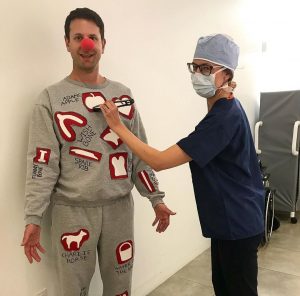Karenna Gore speaks about climate change consequences, issues at keynote address
November 16, 2017
Karenna Gore, the oldest child of former Vice President Al Gore, gave the keynote address for Iona’s Week of the Peacemaker on Nov. 9.
Gore’s speech focused on what she called “our responsibility to live within the natural laws of Earth,” and how science, religion, politics and peacemaking all relate to this topic.
Br. Kevin Cawley introduced Gore and her previous work. Cawley serves as the Edmund Rice Christian Brothers United Nations delegate, the co-founder of the Thomas Berry Forum on Ecological Dialogue and the chair of the College’s Committee on Environmental Sustainability.
Cawley referenced Iona’s “Fight the Good Fight” motto, and said that its meaning has changed since the Christian Brothers selected it when they founded Iona College in 1940.
“We’re fighting now in a different way and with different tools, but we’re still fighting,” Cawley said. “We’re fighting for a renewed relationship between the earth and the human being.”
Gore began her speech by stating that it is “a very strange time” in our history, citing that the United States is the only country that has not joined the Paris Agreement after Syria’s recent decision to join.
Gore referenced two other recent occurrences that make her think about the political aspect of how people view Earth. A newly appointed member of the EPA’s toxic chemical unit wants to rewrite rules to make it harder to trace the health effects of certain chemicals on human health. This member also said that the government shouldn’t burden the private sector with concerns about “phantom risks.” Second, a nominee to run the White House Council on Environmental Equality called concern about climate change “a kind of paganism for secular elites.”
“Why are those who claim to speak up for the link between health of humans and the health of the earth being cast into the realm of pagans and phantoms?” Gore asked.
Gore tied her speech to the theme of the Week of the Peacemaker: “Self+ Other + Earth = A Formula for Our Future.”
Gore said that it is important to understand that climate change is violent, even if it is a slow violence, and that this violence can be seen every time a storm destroys a community. She believes it is the peacemaker’s job to get people to think of Earth as more of the “self” than the “other.”
That said, she admits this is not an easy feat. Gore cited a number of Supreme Court cases that have given personhood and rights to corporations, and talked about how some robots even have rights today.
“As we think about self and other and Earth, we must also embrace this existential moment of kinship,” Gore said. “Do we feel kinship with the natural world around us, as much or more than the artificial intelligence that we ourselves are creating?”
In other countries, such as New Zealand and Ecuador, nature is given rights in their constitutions, according to Gore. Gore said that she can see how giving rights to nature may seem radical, but that all changes that “recognized dignity and worth of life outside of the circle of power of the day” have been radical, such as rights to slaves and women.
Gore ended her speech by saying that although most of the proposals for giving rights to nature are just aspirations, these aspirations matter.
“This is a time for a movement that is both new and bold, for the revelation of what might look to some like a new world,” Gore said. “We have the innovative, explorative spirit to begin to see the great wealth around us as part of a living, breathing reality to be shared in communion, and we also have the courage to take the risk to fight for it.”
After the speech, Gore accepted questions from the crowd.
Brian Rubino, senior and president of IC Green, asked if there were any inspiring things that Gore has found that individuals can be doing to help the cause. Gore explained that having conversations about the issues is the most important way to make progress.
“The most hypocritical thing we can do is to pretend there is no problem at all,” Gore said. “I find that conversations with other people, using your voice in conversation in a persuasive, non-judgmental way is probably the most important thing.”
Gore completed her undergraduate work at Harvard University before graduating from Columbia Law School. She works in a legal center of sanctuary for families, which serves victims of domestic violence and trafficking. She is the director of community affairs for the Association to Benefit Children, which provides early childhood education and other services for families living in poverty. She worked on the editorial staff of Slate Magazine as the author of “Lighting the Way: Nine Women Who Changed Modern America.” She is also the director of the Center for Earth Ethics at Union Theological Seminary.


